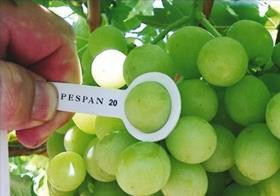
South African table grape growers are expected to increase shipments to the lucrative Chinese market following the finalisation of the approved South African grower list by the Chinese authorities.
The final hurdles have also been cleared for an official visit to South Africa by the Chinese plant health authorities to inspect apple orchards, which will finally open the door to official shipments to China.
The breakthrough came last week during South Africa’s participation in the China World Fruit and Vegetable Trade Fair in Beijing, said Mono Mashaba, the South African industry’s dedicated negotiator for better market access in the Asian markets.
The South African delegation included Hortgro’s Anton Rabe, Elaine Alexander, retiring director of SATI, and Citrus Grower Association CEO, Justin Chadwick.
“This is the first time we could utilise our newly registered legal entity, Fruit South Africa, as a joint negotiation forum,” said Chadwick. “The main purpose was to advance the entry of South African apples, which has now been stalled for some years. We are also pleased that the approved grower list for South African table grape exports to China has also been signed off.”
The South African citrus industry has also raised the possibility of changing the present protocol for exports to China to a systems approach for cold treatment, which would help boost its position in this rapidly growing market.
Mashaba said the Chinese visit to inspect South African apple orchards would hopefully take place fairly early in the New Year. “For the grape growers the last hurdles have now been removed and it will only be a question of amending the list on an annual basis,” he added.
Chadwick said the visit to Asia also included stops in South Korea and Japan, which are both markets where the South African citrus industry is hoping to improve access.
“So far we have identified good opportunities for growth of our oranges in South Korea, while our first shipments of grapefruit have been extremely well received,” he said. “We engaged with the South Korean officials in terms of certain interpretations of the protocol, and hoped that this will go smoothly.”
In Japan, Chadwick said South Africa is seeking to change the cold treatment protocol to bring it into line with conditions applied by other countries, while it is also pushing for wider access for soft citrus. “At the moment we only have access for clementines,” he noted.
Chadwick said that while South Africa is always looking for better access to all its markets, his visit to Asia was not directly related to possible problems with access for South African citrus in the European Union. The EU recently placed a ban on South African citrus for 2013 because of fears of Citrus Black Spot contamination of European citrus orchards and there are concerns that this will be extended in 2014.



